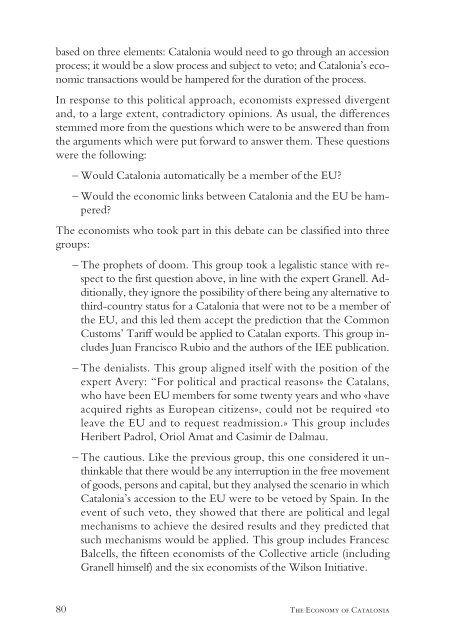The Economy of Catalonia
the_economy_of_catalonia._questions_and_answers_on_the_economic_impact_of_independence
the_economy_of_catalonia._questions_and_answers_on_the_economic_impact_of_independence
Create successful ePaper yourself
Turn your PDF publications into a flip-book with our unique Google optimized e-Paper software.
ased on three elements: <strong>Catalonia</strong> would need to go through an accession<br />
process; it would be a slow process and subject to veto; and <strong>Catalonia</strong>’s economic<br />
transactions would be hampered for the duration <strong>of</strong> the process.<br />
In response to this political approach, economists expressed divergent<br />
and, to a large extent, contradictory opinions. As usual, the differences<br />
stemmed more from the questions which were to be answered than from<br />
the arguments which were put forward to answer them. <strong>The</strong>se questions<br />
were the following:<br />
– Would <strong>Catalonia</strong> automatically be a member <strong>of</strong> the EU?<br />
– Would the economic links between <strong>Catalonia</strong> and the EU be hampered?<br />
<strong>The</strong> economists who took part in this debate can be classified into three<br />
groups:<br />
– <strong>The</strong> prophets <strong>of</strong> doom. This group took a legalistic stance with respect<br />
to the first question above, in line with the expert Granell. Additionally,<br />
they ignore the possibility <strong>of</strong> there being any alternative to<br />
third-country status for a <strong>Catalonia</strong> that were not to be a member <strong>of</strong><br />
the EU, and this led them accept the prediction that the Common<br />
Customs’ Tariff would be applied to Catalan exports. This group includes<br />
Juan Francisco Rubio and the authors <strong>of</strong> the IEE publication.<br />
– <strong>The</strong> denialists. This group aligned itself with the position <strong>of</strong> the<br />
expert Avery: “For political and practical reasons» the Catalans,<br />
who have been EU members for some twenty years and who «have<br />
acquired rights as European citizens», could not be required «to<br />
leave the EU and to request readmission.» This group includes<br />
Heribert Padrol, Oriol Amat and Casimir de Dalmau.<br />
– <strong>The</strong> cautious. Like the previous group, this one considered it unthinkable<br />
that there would be any interruption in the free movement<br />
<strong>of</strong> goods, persons and capital, but they analysed the scenario in which<br />
<strong>Catalonia</strong>’s accession to the EU were to be vetoed by Spain. In the<br />
event <strong>of</strong> such veto, they showed that there are political and legal<br />
mechanisms to achieve the desired results and they predicted that<br />
such mechanisms would be applied. This group includes Francesc<br />
Balcells, the fifteen economists <strong>of</strong> the Collective article (including<br />
Granell himself) and the six economists <strong>of</strong> the Wilson Initiative.<br />
80 <strong>The</strong> <strong>Economy</strong> <strong>of</strong> <strong>Catalonia</strong>


